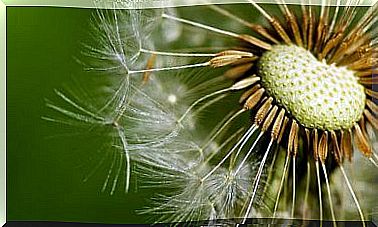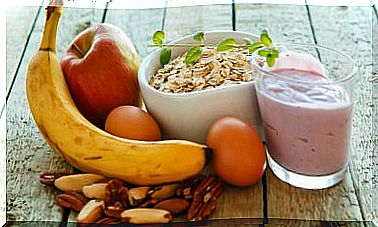Can You Clean The Colon Naturally?
There is much talk today about cleaning the colon. There are no studies that support this need. In fact, specialists maintain that the colon regulates itself, eliminating toxins on its own.

The colon, also called the large intestine, is at the end of the digestive system. It fulfills, among others, the function of evacuating feces but is also associated with the proper functioning of our defenses. At present, much has been said about the need to cleanse the colon, but is this real?
Some specialists argue that certain colon problems could be associated with the way we nourish our bodies. Since it takes care of waste, it is believed that it could accumulate toxins that affect our health. For this reason, alternative medicine recommends regular colon cleansing.
Now, is it necessary to detoxify the colon? The reality is that the function of the large intestine is precisely to get rid of what is not useful to the body, therefore, it would be the one who would fulfill the cleaning function and therefore, detoxification would not be necessary.
In fact, there are no scientific studies that support the need for colon cleansing or its effectiveness. What’s more, doing it could be detrimental to health, by eliminating bacteria that the body needs for its proper functioning.
Should we clean the colon?
Just as colon cleansing would not be necessary, unless it was to carry out a medical study, there are some measures that we could take into account in relation to our diet to take care of our large intestine. Let’s discover them.
If we think of healthy foods for the intestine, the first thing that comes to mind is fiber. We should always choose those foods that contain it naturally and not added artificially. Among the foods that could be good for the colon we find:
1. Plant-based foods

- Fresh or dried fruits : apple, banana, peach, pear, plum, berries …
- Vegetables and vegetables : lettuce, raw carrots, spinach, pumpkin, potato, sweet potato, artichoke, green beans …
- Legumes : lentils, beans, chickpeas, beans …
- Nuts and seeds : walnuts, pistachios, almonds, sunflower seeds …
- Whole grain cereal : bread, grain (rice, millet, quinoa, wheat) and pasta
2. Water
When we increase the consumption of fiber in our diet it is important to also increase the consumption of water between meals, since otherwise the first days we could notice a greater constipation due to the lack of liquid.
In addition, water consumption seems to be associated with a lower incidence of diseases in the colon (Rodrigo and Riestra, 2007). Better hydration of the body would also help the evacuation of waste.
We will drink at least 6 or 10 glasses a day. The amount of water we need will depend on our age, if we make physical efforts and the outside temperature. Some kidney disease or congestive heart failure may also play a role. In this case, we recommend consulting your doctor first.
2. Calcium
Some studies have associated calcium intake with a reduced risk of colon and rectal cancer. However, further research would be necessary to determine if the results correspond to reality.
In any case, incorporating calcium into your diet within normal parameters would be beneficial for you, besides cleaning the colon would not be a necessity. Some sources of natural calcium would be:
- Sesame (in seeds, tahini paste, in oil …)
- Green leafy vegetables such as chard, broccoli, or spinach.
- Blue fish such as sardines or anchovies.
- Legumes, especially chickpeas and soybeans.
- Nuts. Especially almonds (in grain, in drink) and hazelnuts.
- Algae, including hiziki, wakame or arame, which in addition to calcium are a source of infinite nutrients.
3. Vitamin D
Whenever we talk about calcium, we will also refer to vitamin D, since it is essential for its correct assimilation. On the other hand, it would also be associated with the prevention of colon and rectal cancer.
Some foods that contain fatty fish would like salmon, yolk of eggs, products dairy or orange juice and citrus. If we live in a not very sunny area throughout the year, we can value taking it in supplement form.
4. Folic acid
Folic acid or vitamin B9 is associated with cell regeneration, in addition to being essential during pregnancy for the correct formation of the baby.
While some research in the past suggested that it could help prevent colon cancer, a 2015 study found no variations in the risk of colon cancer due to folic acid intake.
Of course, you can (and should) consume foods with folic acid for the proper functioning of your body. You will find it in green leafy vegetables (chard, broccoli, spinach), asparagus, guidantes, lentils, chickpeas, strawberry or orange.
5. Magnesium
This mineral could help us with digestive problems associated with intestinal transit, such as irritable bowel or constipation. Alternative medicine suggests that it would also help prevent the appearance of cancer, however we have not found scientific endorsement of this claim. We can incorporate foods rich in magnesium through products such as:
- Cocoa
- Pumpkin, flax and sunflower seeds
- Almonds
- Cashew nuts
- Brazil nuts
- White beans
- Green peas
- Green leafy vegetables
We can also find it in the form of magnesium chloride supplements .

6. White meat
For our intestinal health we must take into account some foods that may not be so beneficial, since they could generate toxins and waste that would be deposited in the intestine and prevent proper transit. This would be the case of red and processed meats (Rodrigo and Riestra, 2007).
A healthier alternative could be white meat, fish, eggs, or legumes. In addition, it would be advisable to reduce the consumption of fried foods and saturated fats that could irritate the colon.
7. The kuzu, intestinal regulator

Kuzu or kudzu is a powdered root that is believed to have regenerative and regulatory properties that are sustained to “cleanse the colon.” In fact, it is associated with the maintenance of the good state of the intestinal flora. It is worth noting that, to date, there are no scientific studies that support these properties.
How do we take it? To use it, we should dissolve a teaspoon in a cup of water and heat it without bringing it to a boil, stirring until its color changes and the mixture thickens.
In conclusion, although natural medicine supports the need to clean the colon, the reality is that there is no scientific evidence to support it. In fact, it insists on self-regulation of the colon to eliminate waste.
Either way, incorporating healthy foods for your colon would not be a bad idea, not in search of a detoxification but as a habit change towards a more balanced diet. Consult with your doctor if you have questions about it.
Main image courtesy of © wikiHow.com









